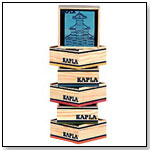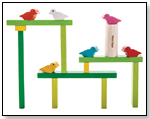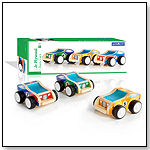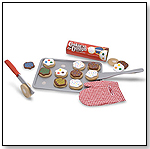|
|
Kapla: A Childhood Dream Fulfilled Chateau Inspires Creation of Unique Construction Planks
As he labored over construction plans, van der Bruggen’s progress soon gave way to discovery … and a new dream. “While elaborating the plans over and over again on paper, I decided to try out models in blocks,” he told TDmonthly Magazine. “I then made an important discovery: Classic wooden blocks are too massive to construct anything; you need planks.” Measure Twice, Cut Once From there, van der Bruggen developed the ideal plank measurements, based on a 1:3:5 ratio that he considers a “compromise between constructive and expressive quality.” If shorter, he noted, the design would lose ideal construction capability, but more length would sacrifice expression. 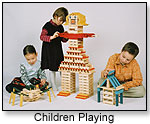 “I later on discovered the importance of the fact that there only should be one size in the construction set,” van der Bruggen shared. “I later on discovered the importance of the fact that there only should be one size in the construction set,” van der Bruggen shared. The single-size planks encourage brain activity, he said, and probably stimulate the part of the brain dedicated to language development, making Kapla (ToyShow) a viable aid for children with language difficulties. Sharon MacDonald, M. Ed., author of “Block Play: The Complete Guide to Learning and Playing With Blocks,” told TDmonthly that playing with blocks in group settings can help children with delayed language development simply because they are “forced to communicate” with others. She added that sets with only one block size, like Kapla, could pose a greater challenge for builders: “The biggest thing I’d say is you are causing them to think because of the sameness of the blocks. It may be more of a mental challenge.” 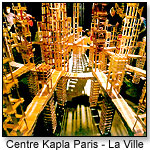 Sacrifice for Success Sacrifice for SuccessLike many entrepreneurs, van der Bruggen encountered a common difficulty of starting a business — lack of financial support — and made a pivotal decision for the company’s sake. “Bankers are not friendly for beginners,” he said simply, “so I sold the castle to keep strong for Kapla.” The other major obstacle he faced had to do with people’s perception of the product … and of themselves. “The fact that adults lose their ability to play, and have difficulties entering children’s feelings in connection to play, was probably the strongest obstacle in the communication of Kapla,” he added. Van der Bruggen said his first success with the product came while sitting on the ground, playing alongside children. He’s happy to see parents doing the same with their children today. Communicate and Connect In the beginning, van der Bruggen admitted, one of the company’s biggest mistakes was “not enough communication about the potential of Kapla.” 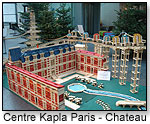 Now, he’s a firm believer in an all-encompassing marketing plan that includes Internet-based promotion, print campaigns, general press coverage, trade shows, exhibitions and special events. Now, he’s a firm believer in an all-encompassing marketing plan that includes Internet-based promotion, print campaigns, general press coverage, trade shows, exhibitions and special events.“I think you must do everything,” he said. Most important, he’s learned that “one good photograph does more than many, many words.” The product’s visual appeal, in fact, contributed to what van der Bruggen considers one of Kapla’s greatest successes — the 1996-97 “La Ville en Jouet” exhibition in the Louvre’s Museum of Decorative Arts. Enter New Markets “Kapla is sold throughout Europe,” as well as in Japan, Israel and Scandinavia, General Partner Marjorie Israel Chayette told TDmonthly. And since its second entrance into the United States in 2001, she added, the product has been featured in various museum exhibits and gift shops, and even schools are ordering sets. “We are steadily drawing interest for this unique product, which is so popular with a large age range,” Chayette said. “There are endless opportunities.” Van der Bruggen, for one, is glad to see the “passion for Kapla” realized in so many places. “My own childhood dream,” he said, “is becoming a reality in millions of children’s rooms.” Here are a few sets Kapla offers:
 Writer's Bio: Julie L. Jones has written articles for both newspapers and magazines. Before joining the staff of TDmonthly Magazine, she worked as a communications writer and provided editorial support for a market research company. Read more articles by this author Writer's Bio: Julie L. Jones has written articles for both newspapers and magazines. Before joining the staff of TDmonthly Magazine, she worked as a communications writer and provided editorial support for a market research company. Read more articles by this author |
| ||||||||||||||||||||||||||||||||||||||
Disclaimer Privacy Policy Career Opportunities
Use of this site constitutes acceptance of our Terms of Use.
© Copyright 2025 PlayZak®, a division of ToyDirectory.com®, Inc.

